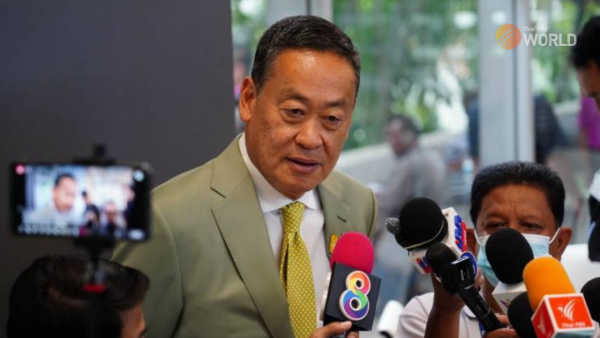Will visa waivers help Thailand’s tourism regain pre-pandemic levels?

Thai tourists are excited at the permanent visa-free agreement signed by Thailand and China, which would make travel for citizens of both countries easy, with large-scale implications for tourism.
Chairat Trairattanacharatporn, a former chairman of the Tourism Council of Thailand, sees the arrangement as offering enormous convenience to Thai passport holders when the permanent visa-free agreement comes into force on March 1.
The Thai government had started the ball rolling soon after it came to power last year by granting visa exemption to Chinese travelers until February 29.
But once China too came on board, the two governments decided to do away with visas for travel by their nationals from March 1.
“At least we can save about 2,000 to 3,000 baht in the cost of visa application,” said Chairat, who plans to visit China on March 2.
Not needing a visa is also a huge time saver, he says, adding that he often makes trips to China for business and travel. He runs a resort in Baan Pe in Rayong province on Thailand’s Eastern coast.
Visa-waiver a giant step
The visa-free agreement is seen as helping win back the confidence of Chinese tourists after they had previously carried a negative view of personal safety in Thailand.
Chairat says his resort business is benefiting greatly from the rising number of Chinese and European tourists.
He observed that Chinese tourists who were free independent travelers (FIT) still maintained a high level of spending power though old people spent less.
Sarapee, the owner of View Point Travel Agency Service in Koh Tao, in Thailand’s southern Surat Thani province, said a rising number of Thai travelers were booking air tickets with her for visiting China following the new visa waiver policy.
As more people book flights to China, the air ticket price is also rising, she said.
Usually, people aged over 50 booked their air tickets through agents, while those between 20-35 years of age usually booked their air tickets online, she said.
Booking an air ticket directly from the airlines is useful for getting a quick refund in cases of emergency, such as the COVID-19 pandemic, which led to flight cancellations, she explained. Refunds are delayed for travelers who book via independent booking websites.
The large numbers of foreign tourists visiting Koh Tao has given the local economy a big boost, she said.
A marketing staffer at Unithai Travel Co, however, said that sale of tour packages for China was stable, and there had been no visible surge in demand as a result of the visa-free agreement.
Read more : Unlocking borders: Thailand and China enter ‘visa-free era’ for tourists
Sisdivalchr Cheewarattanapor, president of the Association of Thai Travel Agents, revealed that many Chinese tour operators had organized road shows in Thailand, suggesting that they were excited about the visa-free agreement and wanted to woo Thai travelers. He expects the agreement to boost two-way tourism.
Currently about 20,000 Chinese tourists visit Thailand daily, up from 6,000-7,000 previously, he said.
He also found that FIT tourists are still big spenders, as they often stayed at luxury hotels. However, tourists who come with a group may spend less because spending power has been affected by China’s slowing economic growth.
The free-visa agreement has won back the confidence of Chinese traveling in Thailand, he said. It would be in the best interests of Thai passport holders if the government could succeed in reaching a similar agreement with European countries.
Such visa-free agreements with several countries would endorse the Thai passport as one of the most powerful passports and upgrade the country’s image internationally, he said.
Srettha sets tall target
Prime Minister Srettha Thavisin said recently that the government was negotiating with European governments for a visa-free agreement.
Srettha aims to lure 40 million foreign tourists this year and the government has announced year-round activities and festivals to draw more tourists as well as target tourism revenue to reach Bt3.5 trillion, up from Bt3 trillion set by the Tourism and Sports Ministry.
Chinese tourists accounted for more than 25 per cent of the nearly 40 million tourists who visited Thailand in 2019 with around 11 million, but the numbers plunged as the world shut down because of the COVID-19 pandemic.
The number of Chinese tourists improved to 3.5 million last year out of a total 28.2 million tourists, only around 30 per cent of the pre-pandemic numbers, according to preliminary data released by the Ministry of Tourism and Sports. The ministry’s target is 35 million tourists this year.
Occupied hotel rooms were 69.3 per cent last year and room rent per night was 1,488 baht on average, or 86 per cent of pre-pandemic levels.
Spending per head was 2.5 per cent lower than pre-COVID-19, according to Krungthai Compass, a research house of Krungthai Bank.
A combined 28.2 million foreign tourists and 249 million Thais traveled locally, generating Bt2.17 trillion revenue for the country last year, according to Krungthai Compass.
It predicts 34 million foreign tourists this year, or 85 per cent recovery rate compared to 2019.
The research house has forecast that foreign tourists plus Thai travelers would generate revenue of 2.52 trillion baht, or 84 per cent recovery. The recovery rate of Chinese tourists is estimated at 63 per cent of 2019.
The slower economic growth at 5.2 per cent in China has partly been blamed for the change in spending habits of Chinese tourists.
China’s economy has been rocked by the real estate sector bubble bursting and local governments being saddled with high debt. The Chinese government prefers that its citizens travel within the country.
Another factor that hangs over the performance of the tourism industry is the airfare. Many travellers are already complaining about the rising prices of air tickets.
Faster tourism recovery
As of February 25 this year, the number of tourist arrivals had gone up 48 per cent year on year to 5.98 million, generating Bt290.9 billion revenue for the country, according to Tourism and Sports Minister Sudawan Wangsuphakijkosol.
Chinese nationals topped the list with 1.1 million visitors, followed by 759,828 Malaysians, 396,006 Russians, 387,745 South Koreans, and 293,129 Indians.
Sudawan said the visa-free agreement between Thailand and China was a key factor in increasing the number of Chinese tourists. The number of European tourists is on the decline as their winter holidays will end soon.
The visa-free facility for tourists from India, Taiwan and Kazakhstan has also provided a boost to the tourism industry as well as increasing flights to and from Thailand.
Thailand currently offers visa waivers to tourists from 61 countries and territories in total while Thai passport holders can visit 34 countries and territories without visa requirement.
Charon Wangananont, president of the Thai Travel Agents Association, expects 11 million Thais to travel abroad this year, slightly lower than 12 million in 2019.
The most popular destination is Japan with an estimated 1.2 million Thai travelers, followed by China 700,000-800,000, and Vietnam 600,000.
By Thai PBS World’s Business Desk






